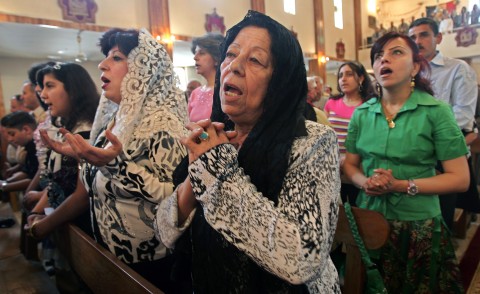Washington-based group rallies leaders to support Middle East Christians

A recent gathering shows how Middle Eastern Christians can put aside their disagreements and take up the cause of their beleaguered sisters and brothers, said Andrew Doran, executive director of In Defense of Christians.
“If Christian voices are able to ring out as one from Egypt to Syria to Iraq, Lebanon and Jordan, then we really do believe it will be possible for Middle Eastern Christians to survive,” Doran said.
In Defense of Christians, a group based in Washington, was founded earlier this year to press the point that Christianity is endangered in the Middle East—its birthplace—and that “the survival of these historic Christian communities is not merely a moral imperative; it is in the interests of all nations and peoples.”
The group organized a conference with prayer, speeches, and a lobbying push on Capitol Hill September 9–11 in Washington, D.C., for Christians from various traditions.
Bishop Angaelos, head of the Coptic Orthodox Church of England, called for unwavering unity in combating the violence faced by Christians and other minorities in the region.
“We haven’t seen this since the atrocities of Genghis Khan in the 13th century,” Angaleos told several hundred people in a hotel ballroom.
There are about 12 million Christians in the Middle East—about 5 percent of the region’s population—and they represent the second-largest religious group after Muslims. At the beginning of the 20th century, Christians represented about one in five Middle Easterners, but many have emigrated due to war and persecution.
Read our latest issue or browse back issues.
Doran said the theme of this first IDC summit is the unity of Christians across the Middle East: the event opened with an ecumenical prayer service. But next year, at the second summit, the push will be for unity among U.S. Christians in defense of their Middle Eastern coreligionists.
Asked about the relative dearth of mainline Protestants at the conference, Doran said there were some, but he hoped more would get involved in the future alongside evangelicals, Catholics, Orthodox Christians, and others.
Mainline Protestants have been relatively quieter in their advocacy for Middle Eastern Christians, said Mark Tooley, a Methodist conference attendee and president of the Washington-based Institute on Religion and Democracy. There may be some mainline Protestants who may feel reluctant to cast stones, he said.
Doran said the cooperative spirit of the conference has been heartening, but that it does not mean that all are agreed on how the threat to Christians in the Middle East should be countered.
One Orthodox leader declared his opposition to military action to stop the Islamic State militants, a view that is not likely widely shared at the conference, Doran noted. The next day, another called the Arab-Israeli conflict the root of Middle Eastern chaos.
That speaker doesn’t speak for the IDC nor his brother patriarchs, said Doran, adding, “But I don’t think we would be inclined to censor that sort of comment. We welcome a diversity of thought.”
Senator Ted Cruz (R., Tex.) was the keynote speaker at a gala in a hotel ballroom. His statement that “Christians have no greater ally than Israel” prompted boos and cries of “stop it!” and “enough” and “no!” as an increasingly louder crowd told him to get off the stage. Cruz tried to continue speaking, but many in the audience expressed anger when he included Hamas in the list of militants out to destroy religious minorities in the Middle East.
“Those who hate Jews hate Christians,” Cruz said. “If those in this room will not recognize that, then my heart weeps. If you hate Jewish people, then you are not reflecting the teachings of Christ. And the very same people who persecute and murder Christians right now . . . are the very same people who target Jews for their faith.”
Toufic Baaklini, IDC president, tried to quiet the crowd, but to little avail. After the incident he issued a statement decrying the outburst against Cruz.
“A few politically motivated opportunists chose to divide a room that for more than 48 hours sought unity in opposing the shared threat of genocide, faced not only by our Christian brothers and sisters, but our Jewish brothers and sisters,” he wrote. The people seen as responsible “were made no longer welcome.” —Religion News Service
This article was edited September 25, 2014.





